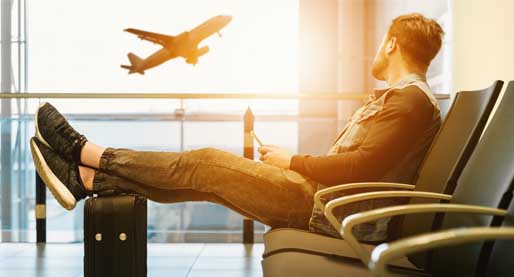Expert Speak
02
April 2020
Surfing the Tourism Wave

The year 2020 began with hopes, aspirations, holiday plans, dreams of exploring new and exotic places and ticking off one more ‘to-do’ from your bucket list. Little did we anticipate what lay ahead — lock-downs, masks, sanitizers, work from home, confinements of homes/hostels, video calls taking over in-person meetings — This is now the ‘new normal’ for free-spirited individuals. Not only did the onset of Covid-19 change our life in many ways, it also changed the way many industries function.
The travel and tourism industry — comprising of aviation, hospitality and cruises — from time immemorial has always faced the impact of any natural calamity or terror attack. Yet, this sector has always been resilient and bounced back. Travelling had become a way of life, several new concepts were being explored and it was all about the experiences. All of this has come to a stand-still with Covid-19 changing the way people look at travelling or even will in future.
Fading of the Glitz & Glamour
A decade ago, being a part of the travel and tourism industry was glamorous, with many perks and benefits. Over the last few years, this ‘glamour’ aspect has slowly been fading. COVID-19 hastened the process. Employees are facing the wrath of not just pay-cuts, leave without pay or even redundancies. The losses are mounting each day and the impact unprecedented. Despite all the hope and resilience, travel will take a very long time to return to entirely normal. A recent survey by done by Pepper Interactive, commissioned by MTOA & TAG, indicates that the industry believes that the people will begin to travel by Christmas, if not Diwali 2020.
The New Travel Pattern
Today, people are so stressed about the pandemic, that though, the first thought of post-lock-down is to get out and travel. Yet, the fear of the pandemic has been deep-rooted.
Travel will never be the same again.
According to Jatinder Paul Singh, Chief Operating Officer, Retail and Leisure Travel at EbixCash, visa norms will now focus more on the health of individuals rather than finances. This is very true. If we look at India pre-COVID-19, the rise of the middle class and disposable incomes, made travel more of a necessity to get away from the hustle and bustle of daily routine rather than a luxury.
This scenario post-COVID-19 will surely change — moving to more necessity-based travel such as short-haul travel, clean destinations and COVID-free locales. This may see a shift once the vaccine is found and people are immune to Covid-19.
Tourism destinations are already finding new ways to attract tourists. Barbados, which has just about 100 cases of COVID-19, has launched a new initiative offering a 12-month visa aimed at remote workers. The concept sounds ideal — working remotely from a lovely Barbados beach.
Staycation deals seem to be the new normal — with Singapore and other countries offering similar programs.
Some others, like Dubai, are launching campaigns indicating the safety and sanitization factors of the city. Dubai Tourism has launched the #ReadyWhenYouAre campaign, highlighting the sanitization aspects of the city.
Meanwhile, Spain takes it a step further and has allotted 4.2 billion euros to help the sector recover.
Closer to home, Indian states are beginning to launch their own campaigns — luring Indian tourists to closer, cheaper destinations. Kerala is targeting people within its state boundaries with the ‘Keralam Kaanam’ campaign. Madhya Pradesh (with its #IntezarAapka campaign), Uttarakhand and Goa have relaxed quarantine norms to attract tourists.
The question, however, remains — when will people be willing to travel?
The Sunrise after Sunset
I certainly believe that ‘every dark cloud has a silver lining’ and this may be very well true even with respect to the travel industry post the pandemic. The concept of domestic travel will certainly increase and this will be very beneficial to India (Survey Report).
Many Indians, who chose international destinations over a trip around India, may well start planning an India tour (I can bet there are so many exotic and untouched destinations within India yet even unknown to Indians). Indians approximately spend $28 billion on international trips. Even a part of this diverted to local spends can kick start the local tourism economy.
Countries now will focus on cleanliness and sanitised surroundings, companies will work towards building an emergency fund (no company can be disaster-proof unless you are in healthcare) and technology will gain prominence.
I would like to end on an optimistic note that as a traveller despite the pandemic, one will keep evolving in their choice and preference. The post-pandemic scenario would actually be beneficial to some unexplored countries/regions/cities to get on the marketing wagon as travellers would now prefer a more personalised and bespoke approach thereby ensuring their health and safety.
